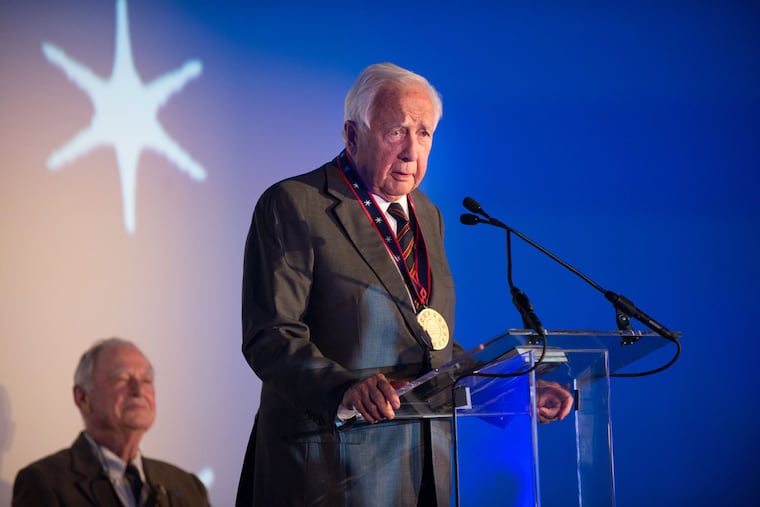David McCullough receives inaugural Lenfest award
David McCullough has won two Pulitzers, two National Book Awards, a slew of literary honors, and the Presidential Medal of Freedom over the course of a literary career that spans more than half a century.

David McCullough has won two Pulitzers, two National Book Awards, a slew of literary honors, and the Presidential Medal of Freedom over the course of a literary career that spans more than half a century.
But, he said in a recent interview, he was most excited to receive the award presented to him Tuesday night at the Museum of the American Revolution in Old City.
McCullough was feted as the inaugural recipient of the Gerry Lenfest Spirit of the American Revolution Award, which will be given to those who contribute to the public's understanding of the Revolution. The cause is one that is dear to him, McCullough said.
"It's a subject that I care deeply about, that I've spent a good part of my writing life writing about," he said. "And to be so recognized is about as high as the moon will get."
McCullough won a Pulitzer Prize for his 2001 biography John Adams, and won his second award four years later with 1776, an examination of the first year of the Revolution. Both were best sellers.
"No author in the U.S. - and the world, actually - has done more to educate the American public on the Revolution and those who made it happen," said H.F. "Gerry" Lenfest, who endowed the award and is the museum's largest contributor, donating $59 million over the last several years. Lenfest is a former owner of the Inquirer, Daily News, and Philly.com.
The two are also friends and dine together at McCullough's house on Martha's Vineyard from time to time. (Lenfest's favorite McCullough book is 1776.)
McCullough's award was a surprise to the evening's attendees; much of Tuesday's event was devoted to honoring Lenfest, the museum's chairman of the board.
"This museum is not the result of me. It's the result of many people," Lenfest told the crowd, which included former Gov. Ed Rendell and former presidential candidate Ross Perot.
The private dinner was the first event the museum had hosted since construction was completed. Its collection, which includes the tent George Washington used at Valley Forge, will be moved in next month.
"It's like a dream," said historian and curator Philip Mead.
He said the museum aims to showcase "the humanity" of those who fought, with humble canteens and newspaper clippings showcased alongside grander items such as the tent.
"History is human," McCullough said, speaking at the dinner later in the evening. Early Americans weren't perfect, he said. The fight for freedom cost tens of thousands of lives and was only supported by a third of the populace. And hundreds of thousands of Americans were enslaved - "anything but free."
Studying the past and all its complexities, McCullough said, remains important.
"You are creating here a place where future generations will be caught in the magic of history," he said.
The Museum of the American Revolution has been in the works for years and is slated to open April 19, 2017, the anniversary of the skirmish at Lexington and Concord that launched the Revolution. The award comes with a cash gift of $25,000, and the museum is accepting nominations for future recipients, said its CEO, Mike Quinn.
McCullough said the museum is "a major expression of patriotism of the best kind." He said it was key to educate future generations about the Revolution.
"I'm very concerned that people are forgetting the values and standards which have proven to be so important to the stability and admirable achievements of our American way of life," he said. "When you have a candidate for the presidency saying he doesn't read books and he doesn't need to read books, that's exactly contrary to what this country was founded on."
(McCullough has maintained neutrality on presidential candidates for most of his career, but this year, he has frequently spoken out against Donald Trump. In July, he called the Republican presidential candidate a "monstrous clown with a monstrous ego" and no experience.)
The museum at Third and Chestnut Streets, McCullough said, "belongs in no other city."
"I don't think that we can ever know enough about the Revolutionary War or about the leaders of the time - particularly the political leadership that was so dramatically present in this city of yours," he said. "This is exactly where [the museum] should be."
Editor's Note: This story was modified to correct the location of the Museum of the American Revolution.
215-854-2961@aubreyjwhelan